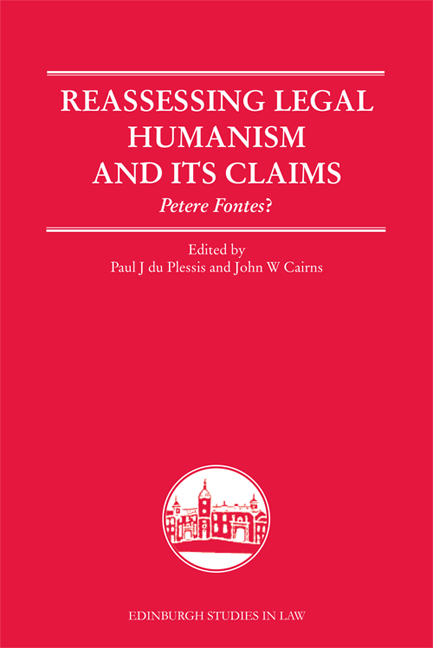Book contents
- Frontmatter
- Contents
- Preface
- A Note on Names and Book Titles
- List of Contributors
- List of Abbreviations
- Introduction
- Part I DEFINING LEGAL HUMANISM
- Part II A BREAK WITH THE PAST/CONTEMPORARY CRITIQUES
- 3 Deconstructing Iurisdictio: The Adventures of a Legal Category in the Hands of the Humanist Jurists
- 4 Reassessing the Influence of Medieval Jurisprudence on Jacques Cujas’ (1522–1590) Method
- 5 Redefining Ius to Restore Justice: The Centrality of Ius Gentium in Humanist Jurisprudence
- Part III LEGAL HUMANISM: A PAN-EUROPEAN METHODOLOGY?
- Part IV LEGAL HUMANISM AND THE BOOK TRADE
- Postscript
- Index
3 - Deconstructing Iurisdictio: The Adventures of a Legal Category in the Hands of the Humanist Jurists
from Part II - A BREAK WITH THE PAST/CONTEMPORARY CRITIQUES
Published online by Cambridge University Press: 05 September 2016
- Frontmatter
- Contents
- Preface
- A Note on Names and Book Titles
- List of Contributors
- List of Abbreviations
- Introduction
- Part I DEFINING LEGAL HUMANISM
- Part II A BREAK WITH THE PAST/CONTEMPORARY CRITIQUES
- 3 Deconstructing Iurisdictio: The Adventures of a Legal Category in the Hands of the Humanist Jurists
- 4 Reassessing the Influence of Medieval Jurisprudence on Jacques Cujas’ (1522–1590) Method
- 5 Redefining Ius to Restore Justice: The Centrality of Ius Gentium in Humanist Jurisprudence
- Part III LEGAL HUMANISM: A PAN-EUROPEAN METHODOLOGY?
- Part IV LEGAL HUMANISM AND THE BOOK TRADE
- Postscript
- Index
Summary
A. INTRODUCTION
B. ὕβρις: THE ORIGINAL SIN
C. φθόνος θεῶν: RIGHTFUL CHASTISEMENT
D. νόστος: THE JOURNEY OF IURISDICTIO
E. IN LIEU OF A CONCLUSION: VERITAS VOS LIBERABIT?
INTRODUCTION
If we were to assess the historical importance of any strand of legal scholarship by its later influence, many great scholars would be utterly marginalised to the benefit of more fortunate ones. This is of course what we do all the time. It is easy. But it is also reassuring: we like to think that time works in a Darwinian sense. We tend to associate the “greatness” of an author with his “payoff”, and measure such a “payoff” by its impact on the development of the law. In principle, this of course has its merits. The problem is that we often start with our modern system. Since we look backwards, we measure with hindsight. This way we build a linear, majestic highway connecting past and present. Anything outside it may be safely overlooked, for it does not lead to us. Moreover, in building our highway we can happily revise the past and straighten any curve – after all, when the road bends it goes in the wrong direction. This way, our functional approach leads not just to oversimplifications, but often straight to re-writing history. More than simplifying, it mystifies. As it happens, legal humanism is one of the best examples of all this. There is no doubt that the sixteenth century is the age of legal humanism. Any textbook on European legal history will tell you that.
We teach legal humanists – as we should – because of their alleged profound influence on the law. Perhaps the implied argument is that, if we were to question their actual influence, we might risk having to reconsider whether to teach them at all. And it is very comforting – and easy – to have a nice group of new figures occupying the sixteenth century. Otherwise one should seriously think of teaching the later ius commune, a subject which unfortunately lacks grand narratives and so is both difficult and terribly variegated from country to country. Whether those “new figures” were effectively doing what we say they were, is not really the point.
- Type
- Chapter
- Information
- Reassessing Legal Humanism and its ClaimsPetere Fontes?, pp. 59 - 87Publisher: Edinburgh University PressPrint publication year: 2015



